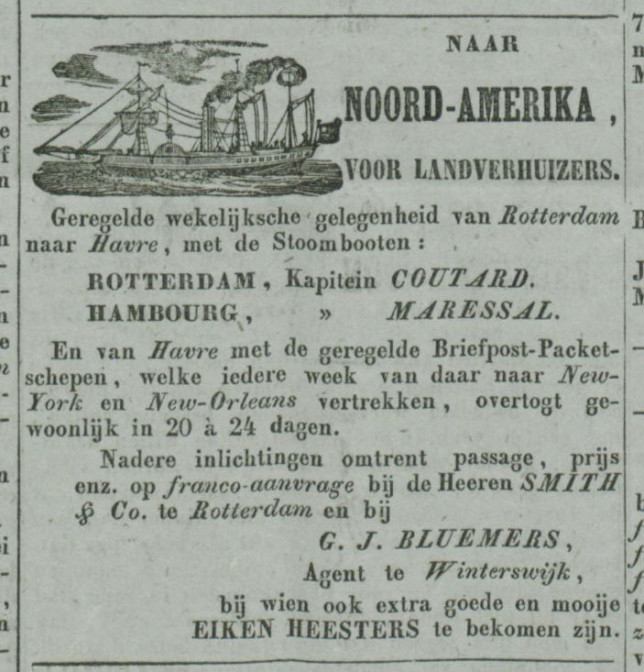Did you ever wonder how your emigrant ancestors bought their tickets and how they knew where to find a ship to go to America? By the end of the 1840s, many shipping companies had agents in most of the emigration hot spots. Emigrants would be able to purchase tickets form these agents, who would arrange for their travel to the harbor and for the trip across the Atlantic. Agents often advertised in newspapers to make people aware of their services. By searching newspapers for the town where your ancestors left from, you can check if there were any agents offering their services. The most comprehensive website for newspapers in the Netherlands is Delpher.
Example: Agent Bluemers in Winterswijk
The following ad gives an example of Gerrit Jan Bluemers, who was an agent in Winterswijk in 1849. The ad translates to:1
To North-America for emigrants.
Regular weekly opportunity from Rotterdam to Havre [Le Havre, France] with the steam boats:
Rotterdam, captain Coutard
Hambourg, captain Maresal.
and from Havre with the regular post-package ships, which leave every week from there to New York and New Orleans, a passage that usually takes 20 to 24 days.
Enquiries regarding passage and price can be made at Mr. Smith & Co in Rotterdam and at
G.J. Bluemers, agent in Winterswijk
who also offers several good and nice oak trees.
Many Winterswijk emigrants left Europe from Le Havre, which was usually less expensive than leaving straight from Rotterdam. This advertisement helps us to understand how they would know that that cheaper option was available. The ad shows that dealing in boat tickets wasn’t the only business Bluemers was involved in, he also traded in wood and was apparently trying to save some money by advertising both services in the same ad.

Advertisement by an agent, 1849.1
- “Naar Noord-Amerika voor landverhuizers,” advertisement, Arnhemsche Courant, 27 January 1849, p. 4, col. 2; consulted as digital image, Koninklijke Bibliotheek, Delpher (http://resolver.kb.nl/resolve?urn=ddd:010043466:mpeg21:p004 : accessed 3 December 2015)


Agents apparently solicited endorsements from the emigrants. My grandfather placed an announcement in the Leeuwaren Courant praising the “treatment they encountered from the NASM and its District Superintendent, Mr. KROES”. I wonder what he got in return? A discount? Upgrades?
In stead of an ‘agent’ the term ‘factor’ apparently was also used. The term was used in the recent Dutch movie Publieke Werken.
And I’ll keep my fingers crossed for you passing your professional genealogists exam!
In Norway, the police, for some reason, kept the records of who emigrated. In that list, my Norwegian g grandmother and her children are shown using a particular agent when they left Kristiania (Oslo) in April 1890. I learned that in this case, at least, the agent was a business, not an individual. This agency had at least one additional office, in Bergen, Norway, and was a large one. Buying a ticket from them at that time included every stage of the trip until you reached your port in America, and you could buy a ticket that included the train to your final destination (i.e. Chicago or Minneapolis). In my ancestors’ case, the entire trip took 11-12 days, which meant they had to have gone on a steamship. The “20-24 dagen” listed in your much earlier ad would imply the ship was a “tall ship,” or a sailing ship. On the sailing ships, steerage passengers had to bring all their own food. On steamships, the food, which was often appallingly bad, was supplied by the steamship company.
I’ve never seen an ad for a Norwegian emigration ship, which doesn’t mean there weren’t any, of course. I have seen copies of pamphlets printed in Wisconsin or Minnesota, specifically for Norwegians, both touting the benefits of the farming and lumbering country in those states, and explaining the customs. They are definitely propaganda! “Amerika letters” were also very important in promoting emigration. These were letters back home to Norway from people who’d already made the journey, urging their family and friends to join them. Again they stressed the benefits of the large amounts of land available, the large crops that could be grown, jobs available, etc. These letters tended to be passed from hand to hand in Norway, and helped to encourage emigration. To a great degree they were propaganda too, but on a much more personal level. I’ve seen some in museums.
Looking at the police report of people leaving Norway, each used an agent, whether a person or a commercial agency. You had to buy your ticket from someone. Was that true in the Netherlands as well?